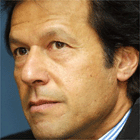 Adil Najam
Adil Najam
Flying in from London to Islamabad, I bumped into Imran Khan on the plane. There he was, sitting a couple of rows ahead of me, reading The News, with his own picture on its front page (meeting Nawaz Sharif in London). I had not yet seen the paper, nor followed that days events in London (I was flying in from Amsterdam where I had been in meetings all day). We exchanged a few pleasantries, said nice things about what we had been up to since we had last met in Chicago just about a year ago (I had reported in detail on that here).
I must say, I did not fully grasp everything he said until later after I landed in Islamabad and first saw his supporters and TV cameras lined up at the airport, and then every news channel covering his press conference in London, and its political implications. In our short conversation he pretty much covered the exact same points I saw him presenting on TV,with pretty much the same passion. I guess he had come fresh from the press conference. Since all of that is now in the news already, I will not repeat it. The one thing I did ask him about were rumors about his ‘patch up’ with the MQM leading to the lifting of the ban on his entry into Sindh. Readers would remember those rumors surfacing everywhere, including on ATP, a few days ago. He shrugged those away as nonsense and just rumors.
My own sense from this very brief discussion chat was that:
(a) he does seem very serious abut taking on MQM Chief Altaf Hussain,
(b) that he fully realizes the seriousness of what he is doing, and
(c) he seems to be doing this out of personal conviction much more than political opportunism.
I may turn out to be wrong, but my first impression was that the earnestness with which he spoke about what he was doing and why that cannot be easily faked. This, then, seems not to be a story that will fizzle away easily. Not if Imran can help it.
 If this is, in fact, so then Pakistan politics will continue to become even more interesting than it already is. ‘Party’ politics may just come back into limelight, but not ways one had expected. If indeed there are to be elections in Pakistan soon then the impact of this tussle could go well beyond defining what happens to just Imran Khan and the MQM.
If this is, in fact, so then Pakistan politics will continue to become even more interesting than it already is. ‘Party’ politics may just come back into limelight, but not ways one had expected. If indeed there are to be elections in Pakistan soon then the impact of this tussle could go well beyond defining what happens to just Imran Khan and the MQM.
By the way, as it turned out it was an interesting PIA fight to be on. Interior Minister Aftab Sherpao boarded soon after me. As did Commerce Minister Humayun Akhtar Khan (returning, I believe from the WTO meeting in Geneva). They both greeted Imran graciously, and briefly, and then then nearly all of us made the best of the overnight flight by going off to sleep. Of course, I first watched the ‘Tribute to a Legend’ show on Pakistani filmstar Muhammad Ali on the PIA channel.
P.S. In case you wonder, no, I did not speak to either of the Ministers. I do not know either of them, and would not have known what to say anyhow, especially if either of them had seen my own most recent musings on the political happenings in Pakistan.




















































People in opposition always say they will do this and do that but they are really judged when they are in power. So far who ever became in power dishearted all of us. Imran Khan will also be judged really whenever he will become a head of state. So wait and see now.
Skeptic:
You said this:
“Winning the 1992 world cup and building the cancer hospital. These are big achievements in cricket and social work but not in politics and statesmanship.”
True. But, pls kindly show any leader in Pakistan with big achievements in politics and statesmanship.
Skeptic:
You said this:
“Winning the 1992 world cup and building the cancer hospital. These are big achievements in cricket and social work but not in politics and statesmanship.”
Pls kindly show any leader in Pakistan with big achievements in politics and statesmanship.
Faraz: Nobody is saying that one political party should be banned. What people are saying is that MQM should become a proper political party displaying democratic norms and with no fascists or terrorist inclinations such as one we witnessed on May 12 or earlier on.
I agree that there are other political parties as well with “armed wings”. Here, what is important to take note of is that the process or movement against this armed political parties has started (with “fascist/terrorist MQM”). Sooner or later, we would demand our political parties to get “unarmed” as well.
Mustafa: All I’d like to say is that it is very difficult to find one person with “clean track record” since his birth in Pakistan.
It’s true that Imran did commit mistakes in the past, but compare those with what Benazir, Altaf, Nawaz and Musharraf did.
I think he should give a second thought to Imran. He talks with passion and energy, and with honestly and frankness, and even himself admits his mistakes of the past. Let’s give him our support at this important juncture of our country’s life.
Imran Khan, no doubt, was a wonderful cricketer but even as a captain of the team he was an autocratic kind of a person. In cricket we can afford to have an autocrat as a captain because the scope is very limited. He was an all-rounder and he knew well about bowling, batting and fielding. That’s why he handled the team very well and we managed to win the 1992 world cup. But compared to cricket the scope of politics and statesmanship is very broad. You cannot possibly know everything about economy, external and internal policy, health and education, management and planning, and host of other issues. That’s why it is imperative that you must listen to your advisors, debate the issues in the parliament and reach a decision based on consensus. But being an autocrat, Imran Khan lacks these qualities. It is always easy to sit in the opposition and criticize the government to your heart’s content but when you are at the helm of affairs then you have a big responsibility on your shoulders and the fate of millions of people depend on the decisions you make.
How many good decisions have Imran Khan taken since he joined politics? If he had some foresight and knowledge of Pakistani politics he should have joined Muslim League or People’s Party. But instead he established his own Tehrik-e-Insaaf and won only a single seat in the parliament. In one of his interviews he said that he is following the footsteps of Zulfikar Ali Bhutto who single-handedly managed to mobilize the people, laid the foundations of People’s Party and won the elections of 1970 in West Pakistan. But before doing all this Bhutto had a lot of achievements to his credit. He worked at various ministerial positions in Ayub’s cabinet then served as a foreign minister and finally jumped off the sinking ship of Ayub Khan. What achievements did Imran Khan had to his credit before laying down the foundations of Tehrik-e-Insaaf? Winning the 1992 world cup and building the cancer hospital. These are big achievements in cricket and social work but not in politics and statesmanship.
Tehrik-e-Insaaf, strictly speaking, is not a political party. It is a one-man-show. There is a big problem with our politicians that they stress a lot on democracy and general elections but when it comes to democratic structure and intra-party elections in their political parties they behave like autocrats and handle their political parties like hereditary fiefdoms. Fact of the matter is that our politicians only pay lip-service to the cause of democracy and democratic norms. All they care about is power. There is no spirit of public service. When their political opponents are in the office they use all means at their disposal, fair or foul, to bring them down. Why can’t they be patient and wait for their turn? There is something called professional courtesy, why do our politicians lack it? If the five years time period for holding general elections is too long, would it not be more appropriate to reduce it to four or three years?
Coming back to the topic Imran Khan is an ambitious person. I’ve read in one of his biographies written by an English author that if he did not had a career in cricket then he would have joined the Civil Service of Pakistan. Apparently there is nothing wrong with being ambitious and having a lust for power. But the important question is that how much control do you have over your desires? And if there is a conflict of interests between your personal interest and the larger public interest, can your sacrifice your personal ambitions for the sake of larger national interest? If Imran Khan cannot control his lust for sex how can we assume that he will overcome a much more addictive lust, i.e. Power?